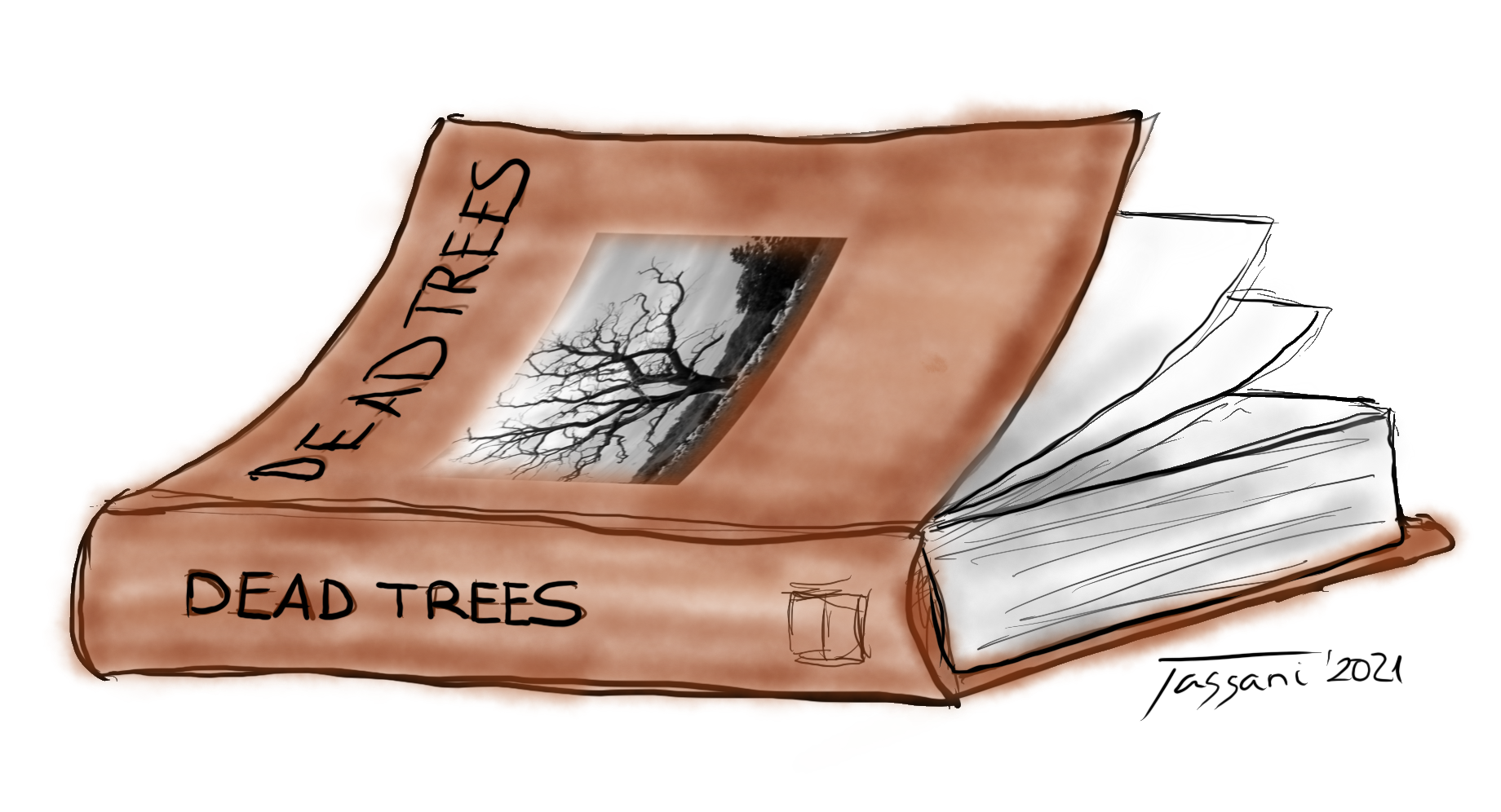Dead trees
13 min read
Paper is made from wood pulp and that’s why the expression “dead tree” is used to refer to anything made out of paper, in particular books. You can even find the adjective “dead-tree” in Merriam-Webster or Collins dictionaries online. As an adjective, you can say “the dead-tree edition of that document”.
Can be a book something that is not dead trees?
Electronic books
Electronic books have been with us for a long time with different levels of fidelity and quality, from simple text files to multimedia interactive books. With Digital Rights Management (DRM) protection some publishing companies accepted e-books and dedicated devices to read have been moving more people to electronic reading.
Now, you can read the same content you have on paper using an e-book reader, a tablet or even your phone. The distribution of the pages may not be the same and if the book contains images or colour pages some details may be lost, but you can carry several books without bothering about their weight.
Some e-books are pure digital, with video or interaction options, but I want to focus on the ones that can be both digital and paper. Some books are born digital with the option to be printed, like in Lulu. Some are born pure e-book, like in Leanpub. Some e-books are free like the ones in Project Gutenberg and some can be bought in stores like Kindle, Google Play, Apple Books or eBooks.com. You can find books that were on paper and were converted to digital form in O’Reilly Learning and some books only exist in a digital medium, like Simon Wardley’s Wardley Maps [1]. To add more variety, some authors have converted their digital blog posts into printed books like Tobias Mayer’s The People’s Scrum or Michael Lopp’s Managing Humans.
Audiobooks
And there are audiobooks. An audiobook is a recording of someone reading a book to you. It can be a digital voice created via a Text-to-Speech system, the author, an actor or someone else. You have the same content as in the book, but you don’t have to use your eyes to read it. Are audiobooks books?
There are cases where audiobooks are far better than their physical pair: when you cannot use your eyes. It may be a temporal or permanent circumstance, or because you are using them while performing another activity like driving, washing dishes or walking.
A friend of mine told me he reads business books faster when he reads and, at the same time, listens to the audiobook played at high speed: it helps him to keep the focus.
Book summaries
Another phenomenon I’ve come across recently is book summaries: services that provide brief book summaries, sometimes in audio format. You can get a gist of a business book in less than 10 minutes. Blinkist and Instaread offer book summaries. They are ideal for the busy person who wants to stay up to date knowing what other people are learning. They get a view of the destination but they miss the journey. Like saying you’ve been to Paris because you’ve seen a picture of the Tour Eiffel. I would not say they have read the book.
The magic of reading
Reading requires attention and a mental effort of decoding or recognising symbols in your head. A collection of sheets of paper, the product of dead trees, become alive once you start revealing its content: when you read. There is a transformation of languages, there is a mapping from different levels of abstraction that I’ve always found magical. That process is different when you are listening.
The book as an object is another fascinating topic. I remember buying music albums, arriving home, and playing them carefully, full of attention while looking at the cover and lyrics. Once played, the album was stored with my collection and whenever I glanced over it, I was capable of listening to the music again in my head. Just having it visible on my shelf was useful for my memory.

Something similar happens to me with the books on my shelf. When I look at them I remember their content, where I bought them, what I was doing when I read them, what I felt when I was reading them, … The physical objects act as an anchor to the knowledge I got from them or the adventures I experienced when reading them. And that anchor is used every time they are in front of me. I don’t get these echos with electronic books.
Dead
You cannot ask a question to a book, electronic or on paper. You cannot start a debate. It contains an idea that was set in the past and, maybe, the author is not currently fond of it. Some critics saw the advent of websites, forums and blogs as the right replacement for books. The can be changing all the time. They can evolve as their authors’ minds.
I like that books are a snapshot in time. The idea has been disconnected from the author and you can share with others and discuss it. You can give a pointer to start the conversation.
When I read The Leprechauns of Software [2] I was puzzled by the title of the preface: “This book is a work in progress”. It is published in Leanpub, and they allow this model: the author can share as they progress and readers can support, even if the work is not complete. That book in particular looks finished, it is consistent as it is and it has not been updated since 2017. I cannot reference a page of the book because I don’t know if it will change in the future. I like the commitment that books imply.
The book as an experience
A novel, a history book, a philosophy essay, a comic book, and a business book, are very different but all of them are books. I would like to distinguish only between reading for learning and reading for leisure. When I read for leisure, I like to enjoy my time and I go through the contents and that’s it. When I read for learning, I take notes and I search for things on the internet. What I remember about the book is important to me in this case.
I’ve realised that I recall better the contents of physical books. Usually, I remember “it was on the lower part of a right page” or “about half a centimetre of pages before the end of the book”. I don’t have these cues in electronic books. I also remember the covers, the colours and the touch of the pages. I lose these with my Kindle.
It’s a very different experience to hold a pocketbook than a hardcover. A new book with the pages cracking or an old one with yellowish pages.
I have many books signed by their authors. I loved reading Julio Cortázar’s Rayuela (Hopscotch in English) and going back and forth the pages, something I wouldn’t have experienced clicking on a link. I like to see the wrinkled spines of my books and the faded away covers. I remember I read that book on the beach, I bought that one at that airport and this one was a special gift. Books, as an object, have been a companion to me. They carry more stories than the ones written inside.
Books read
I bought my first Kindle in 2019 and, before that, I had read electronic books using an iPad. I had also read book parts on my phone. Now, I combine electronic books with dead-trees ones and I like to have one book-in-progress of each type. I can take my Kindle everywhere and I have a dictionary at my fingertip. I can start reading a book in English a few seconds after I’ve paid instead of waiting for the delivery, and it does not take any space on my bookshelf. I can choose a big font size which is helpful for my eyes and I can search for words.
I only read the paper book at home. I don’t pay attention to the “what’s better, paper or electronic books” discussion. It seems like the theatre vs. cinema one: they are different.

Audiobooks have not worked for me. I have only tried books in English and I haven’t tried in my native languages yet. Being a non-native English speaker, I tend to look up words in the dictionary and re-read whole paragraphs. When I am listening, if there is a word I don’t get, it affects my attention. The apps I have tried have to improve, with bookmarks, notes, and easy rewind.
A few years ago I tried the audiobook The Ocean at the End of the Lane read by its author, Neil Gaiman, and I enjoyed it but I was reading at the same time. Now that I have had higher exposure to English in conversations and podcasts I could try another one.
Some participants in book clubs I am in listen to the audio version (they say they “read audiobooks”) and they share a similar understanding of the content that the ones who read the words. I wish I could do more audiobooks.
The “Gutenberg parenthesis” [3] suggests that humans have been immersed in an oral culture that has been suspended 500 years since Gutenberg’s invention of the printing press. With the printing press, the only ideas that survived were the ones that could find the funding to be on paper. Now, with digital media, we are returning to a second “orality” based on a return to fluidity in communication.
Reading is démodé, videos are easier to consume and books do not hold the authority of knowledge. Some say that nobody likes reading but some like having read. I disagree. I will continue reading because I love it. Dead trees or not.
Toni Tassani — 25 April 2022
This article was originally published on 15 March 2021 on the company intranet.